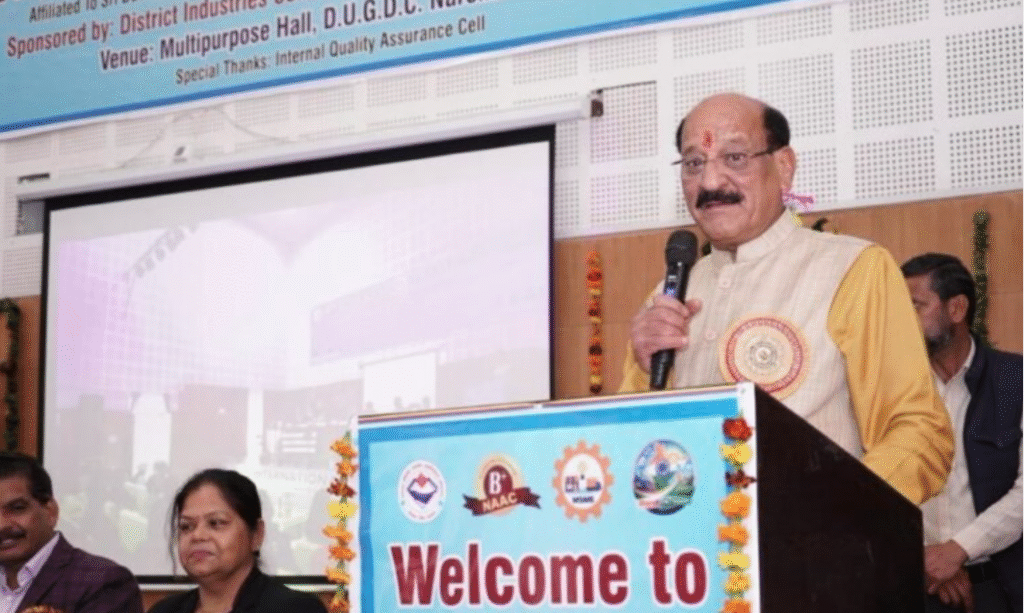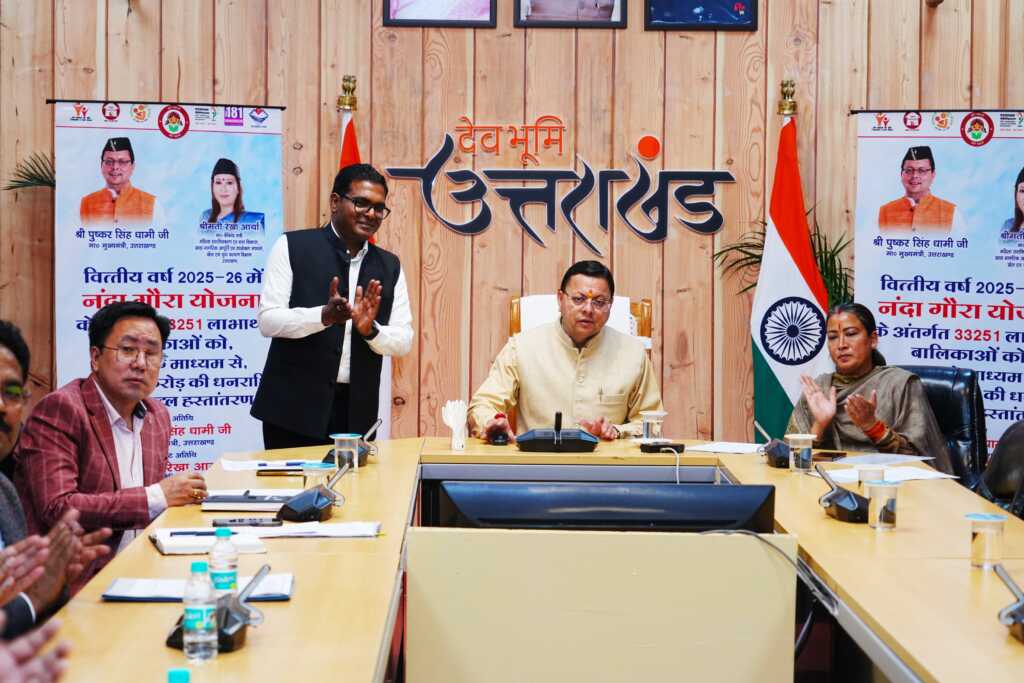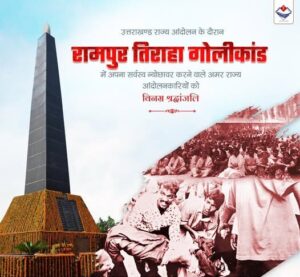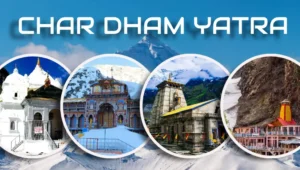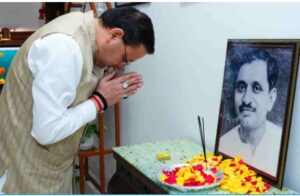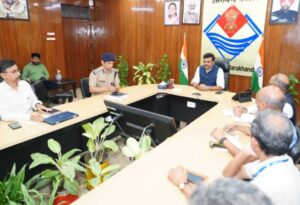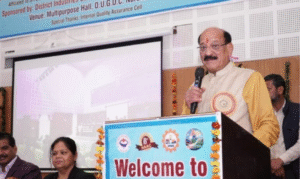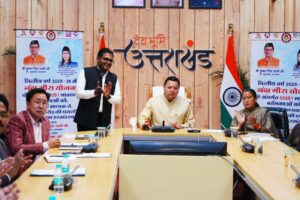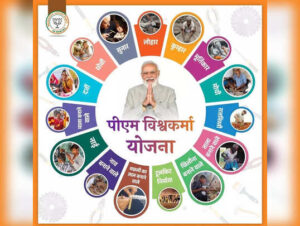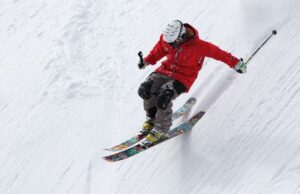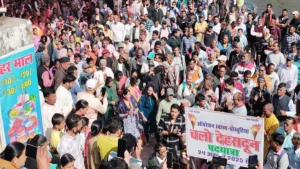Uttarakhand
2 अक्टूबर 1994: बलिदान की वह तारीख जो उत्तराखंड की चेतना में अमर है..
रामपुर तिराहा गोलीकांड के अमर शहीदों को श्रद्धांजलि, उत्तराखंड राज्य निर्माण आंदोलन के बलिदानों को किया गया याद मुजफ्फरनगर रामपुर तिराहा कांड की 30वीं बरसी...
चारधाम कपाट बंद होने की प्रक्रिया शुरू, जानिए सभी धामों की तिथियाँ…
भू-बैकुंठ श्री बदरीनाथ धाम के कपाट 25 नवंबर को होंगे बंद, केदारनाथ, मद्महेश्वर और तुंगनाथ धामों की शीतकालीन यात्रा तिथियाँ भी घोषित उत्तराखंड स्थित चारधामों...
पंडित दीनदयाल उपाध्याय जयंती पर सीएम धामी ने किया नमन, प्रतिमा पर अर्पित की श्रद्धांजलि
पंडित दीनदयाल उपाध्याय की जयंती पर मुख्यमंत्री पुष्कर सिंह धामी ने उनको नमन कर श्रद्धासुमन अर्पित किए। मुख्यमंत्री पुष्कर सिंह धामी ने गुरुवार को पंडित...
UKSSSC पेपर लीक : उत्तराखंड के युवाओं का आक्रोश, परीक्षा निरस्ति व निष्पक्षता की माँग…
यह रही एक समाचार की रिपोर्ट — आप इसे आगे एडिट करके इस्तेमाल कर सकते हैं: शीर्षक: UKSSSC पेपर लीक : उत्तराखंड के युवाओं का...
“मुख्य सचिव आनंद बर्द्धन ने लैंड स्लाइड न्यूनीकरण पर राष्ट्रीय स्तर के संस्थानों के साथ विचार-विमर्श किया”
मुख्य सचिव आनन्द बर्द्धन ने मंगलवार को वाडिया हिमालय भू विज्ञान संस्थान, जीएसआई, इंडियन इंस्टीट्यूट ऑफ रिमोट सेंसिंग, सेंट्रल वॉटर कमीशन आदि राष्ट्रीय स्तर के...
“राजपुर में ‘GST बचत उत्सव’: मुख्यमंत्री पुष्कर सिंह धामी ने दुकानों का दौरा किया”
मुख्यमंत्री पुष्कर सिंह धामी ने मंगलवार को राजपुर, देहरादून में “GST बचत उत्सव” के तहत विभिन्न दुकानों का भ्रमण किया। इस अवसर पर उन्होंने व्यवसायियों...
Social Media Viral

Gemini ने बनाई ऐसी तस्वीर, फोटो देख सोच में पढ़ गए लोग….
गूगल जेमिनी का नैनो बनाना फीचर इन दिनों ट्रेंड में है। लेकिन एक इंस्टाग्राम यूजर ने चौंकाने वाला दावा किया है कि उनकी छिपी हुई...

दुनियाभर से पीएम मोदी को मिल रही बधाई….
प्रधानमंत्री मोदी के जन्मदिन पर दुनियाभर के नेता उन्हें शुभकामनाएं दे रहे हैं। ऑस्ट्रेलिया, न्यूजीलैंड और भूटान के प्रधानमंत्रियों ने जहां पीएम मोदी को बधाई...

ट्रंप करेंगें न्यूयॉर्क टाइम्स पर 15 अरब डॉलर का मानहानि का मुकदमा दायर….
ट्रंप ने कहा कि कभी सम्मानित रहे अखबार के खिलाफ कार्रवाई करने पर उन्हें गर्व है, जैसा कि उन्होंने पूर्व में कई अखबारों और मीडिया...

मंत्रिमंडल विस्तार की सुगबुगाहट शुरू, सीएम से विधायकों की भेंट का सिलसिला शुरू……
मुख्यमंत्री श्री पुष्कर सिंह धामी से रविवार को मुख्यमंत्री आवास में विधायक श्री सहदेव पुंडीर, श्री खजान दास, श्री सुरेश चौहान, श्री भरत चौधरी, श्री...

Gordon Hayward still fan of esports, not yet investor
In the dynamic world of WordPress, we emerge as a beacon of innovation and excellence. Our popular products, like CoverNews, ChromeNews, Newsphere, and Shopical, alongside...

 अमेरिका कुछ देशों पर टैरिफ बढ़ाकर 15 प्रतिशत करेगा
अमेरिका कुछ देशों पर टैरिफ बढ़ाकर 15 प्रतिशत करेगा  मुख्यमंत्री धामी ने किया नयार वैली फेस्टिवल का उद्घाटन
मुख्यमंत्री धामी ने किया नयार वैली फेस्टिवल का उद्घाटन 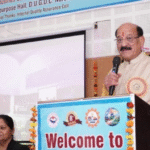 शिक्षा, नवाचार और युवा सहभागिता से साकार होगा विकसित भारत- सुबोध उनियाल
शिक्षा, नवाचार और युवा सहभागिता से साकार होगा विकसित भारत- सुबोध उनियाल  33,251 बालिकाओं को मिले 145.93 करोड़, नंदा गौरा योजना का पैसा जारी
33,251 बालिकाओं को मिले 145.93 करोड़, नंदा गौरा योजना का पैसा जारी  उत्तराखंड में जनगणना के पहले चरण की अधिसूचना जारी, 25 अप्रैल से शुरू होगी मकान गणना
उत्तराखंड में जनगणना के पहले चरण की अधिसूचना जारी, 25 अप्रैल से शुरू होगी मकान गणना 

